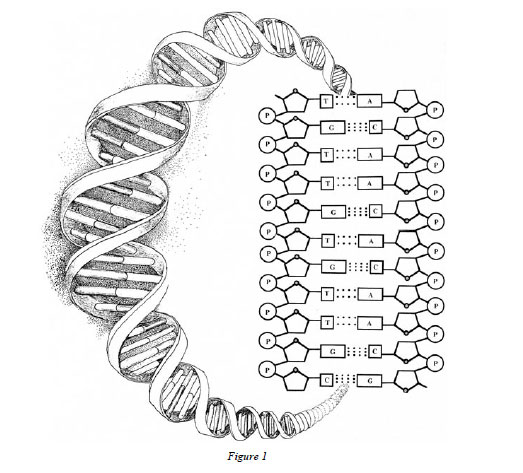What is the Probability of Evolution Occurring Solely by Natural Means?-Part 1
| By: Dr. John Ankerberg, Dr. John Weldon; ©2001 |
| Most modern scientists are in general agreement that the materialistic theory of evolution is an established fact of science. However, what one concludes about human origins is one of the most crucial points for deciding a whole range of other issues. |
What is the Probability of Evolution Occurring Solely by Natural Means?—Part One
Anyone who majored in philosophy in college read the noted French existentialist Jean Paul Sartre. I (John Weldon) can still remember agonizing through Being and Nothingness and some of his other works. As an ardent promoter of atheism, Sartre was probably responsible for turning as many college students to atheism as anyone. Nevertheless, this famous atheist also made the following confession, just prior to his death, during an interview with his wife, published in Harper’s magazine for February 1984 (p. 39):
- As for me, I don’t see myself as so much dust that has appeared in the world but as a being that was expected, prefigured, called forth. In short, as a being that could, it seems, come only from a creator; and this idea of a creating hand that created me refers me back to God. Naturally this is not a clear, exact idea that I set in motion every time I think of myself. It contradicts many of my other ideas; but it is there, floating vaguely. And when I think of myself I often think rather in this way, for want of being able to think otherwise.’
Yet Sartre next proceeded to declare that his atheism had provided his life with strength and freedom and that he had no need of God whatever. For him, God was entirely irrelevant and therefore he noted he had paid no attention to God his entire life.
Sartre, of course, as the above quote tells us, could never escape the knowledge of God, and neither can modern science. Romans 1:18-22 tells us that all men intuitively know God exists through the evidence in creation. This evidence is “clearly seen” “because God has made it plain to them.” Therefore, “men are without excuse” because they “suppress the truth” they already know.
Nowhere is this situation more clearly revealed than in the creation/evolution controversy. Most modern scientists are in general agreement that the materialistic theory of evolution is an established fact of science and cannot logically be questioned as a view of origins. However, what one concludes about human origins is one of the most crucial points for deciding a whole range of other issues, whether positively or negatively—from the nature of man and the purpose of life to the relevance of morality and religion to the future of humanity. Is man only the product of the impersonal forces of matter, time and chance with all this implies—or the purposeful creation of a good and loving God with all this implies?
As esteemed philosopher Mortimer Adler wrote in The Great Ideas (Vol. 1, p. 543), “More consequences for thought and action follow from the affirmation or denial of God than from answering any other basic question.”
For example, the theological impact of materialistic evolution is beyond question. In our The Facts on Creation vs. Evolution we noted that Dr. Colin Brown received his doctorate degree for research in nineteenth-century theology. As far as the impact of evolution on Christianity, he pointed out, “By far the most potent single factor to undermine popular belief in the existence of God in modern times is the evolutionary theory of Charles Darwin.” According to Martin Lings, “More cases of loss of religious faith are to be traced to the theory of evolution… than to anything else.”[1]
Again, scientists generally are convinced as to the truth of a purely materialistic chance origin of mankind. Many of these scientists (and most atheists) have even rejoiced at the supposed “overthrowing” of the biblical concept of creation.
An article by C. D. Darlington of Oxford University in Scientific American (May 1959, p. 66) noted, “We owe to The Origin of Species the overthrow of the myth of creation, especially the dramatic character of the overthrow.”
The American Atheist for September 1978 also noted the following:
- “Evolution destroys utterly and finally the very reason Jesus’ earthly life was supposedly made necessary. Destroy Adam and Eve and the original sin, and in the rubble you find the sorry remains of the son of god… If Jesus was not the redeemer… and this is what evolution means, then Christianity is nothing….”
Leading evolutionist Sir Julian Huxley claimed “Darwinism removed the whole idea of God as the Creator of organisms from the sphere of rational discussion.”[2]
Evolution, of course, continues to be set forth as an established fact by the scientific community, but principally because of the materialistic, naturalistic viewpoint that pervades the scientific world.
Pierre-Paul Grasse, the renowned French zoologist and past president of the French Academy of Sciences, states in his Evolution of Living Organisms:
- “Zoologists and botanists are nearly unanimous in considering evolution as a fact and not a hypothesis. I agree with this position and base it primarily on documents provided by paleontology, i.e., the [fossil] history of the living world.”[3]
Theodosius Dobzhansky, who, according to another leading evolutionist, Steven J. Gould of Harvard, is “the greatest evolutionist of our century,”[4] asserts in his award-winning text, Mankind Evolving, “The proofs of evolution are now a matter of elementary biology…. In Lamark’s and Darwin’s times evolution was a hypothesis; in our day it is proven.”[5]
World famous scientist George Gaylord Simpson, distinguished professor of vertebrate paleontology at the Museum of Comparative Zoology at Harvard, emphasizes in The Meaning of Evolution, “Ample proof has been repeatedly presented and is available to anyone who really wants to know the truth…. In the present study the factual truth of organic evolution is taken as established….”[6]
Carl Sagan is a distinguished Cornell University astronomer and Pulitzer prize-winning author. He is perhaps best known as the host and co-writer of the Cosmos television series, seen in 60 countries by approximately three percent of all people on earth. The hardcover edition of Cosmos was on the New York Times best-seller list for 70 weeks and became the best-selling science book in the English language in the twentieth century. In this book, Sagan simply states, “Evolution is a fact, not a theory.”[7]
But we have shown in our The Facts on Creation vs. Evolution and elsewhere, these scientists are simply wrong.[8]
Indeed, the idea that all life has come from dead matter by pure chance is a bit difficult to swallow, even for many scientists. And, as modern science increasingly uncovers the indescribable complexity of the living world and simultaneously fails to explain the nature of abiogenesis (the idea that life can somehow originate from non-life), the miraculous nature of all theories of origins seems to be made more apparent. In a sense, the term miracle is no longer properly restricted to only creationist belief.
Thus, although most scientists remain evolutionists by choice because they are materialists, the theory of the origin of life by natural means is increasingly challenged today even in scientific circles. Further, as Dr. R. L. Wysong points out in his survey of the evidence, The Creation Evolution Controversy, acceptance of organic evolution is hardly a proven scientific fact. Rather, it is a materialistic postulate requiring a great deal of faith:
- Evolution requires plenty of faith: A faith in L-proteins [“left handed” molecules] that defy chance formation; a faith in the formation of DNA codes which, if generated spontaneously, would spell only pandemonium; a faith in a primitive environment that in reality would fiendishly devour any chemical precursors to life; a faith in [origin of life] experiments that prove nothing but the need for intelligence in the beginning; a faith in a primitive ocean that would not thicken but would only hopelessly dilute [life-generating] chemicals; a faith in natural laws including the laws of thermodynamics and biogenesis that actually deny the possibility for the spontaneous generation of life; a faith in future scientific revelations that when realized always seem to present more dilemmas… faith in probabilities that treasonously tell two stories—one denying evolution, the other confirming the creator; faith in transformations that remain fixed; faith in mutations and natural selection that add to a double negative for evolution; faith in fossils that embarrassingly show fixity through time, [and the] regular absence of transitional forms….[9]
There are also a host of other problems equally intractable in nature, such as the lack of a reducing atmosphere (the presence of free oxygen), which further complicates the alleged process of abiogenesis. Biochemists generally agree that the presence of free oxygen would, in the words of R. T. Brinkman of the California Institute of Technology, “preclude biological evolution as presently understood.”[10] Yet the evidence for an early-oxidized atmosphere on earth is increasingly so compelling that Henderson-Sellers, Benlow, and Meadows concede that, despite the implications, it is “becoming the new orthodoxy.”[11]
Indeed, respectable, technical, scientific texts that, on the one hand, show the doubtful or even impossible nature of evolution, or, on the other hand, present strong scientific evidence for creation are now increasing in number. Among many titles that could be listed are: A. E. Wilder-Smith (who holds three earned doctorate degrees in science), The Natural Sciences Know Nothing of Evolution, and The Scientific Alternative to Neo-Darwinian Evolutionary Theory: Information Sources & Structures; molecular biologist Michael Denton, M.D., Evolution: A Theory in Crisis; Evan Shute, M.D., Flaws in the Theory of Evolution and noted University of California Berkeley Law Professor Phillip Johnson’s Darwin on Trial.
Notes
[Most of the material for this article was excerpted from John Ankerberg and John Weldon, “Rational Inquiry and the Force of Scientific Data: Are New Horizons Emerging?” Taken from The Creation Hypothesis edited by J. P. Moreland. ©1994 by J. P. Moreland. Used by permission of InterVarsity Press, P. O. Box 1400, Downer’s Grove, IL 60515, pp. 272-277, 291-292, and John Ankerberg, John Weldon, The Facts on Creation vs. Evolution (Eugene, OR: Harvest House, 1993), portions of Question 8.]
- ↑ See John Ankerberg, John Weldon, The Facts On Creation vs. Evolution (Eugene, OR: Harvest House, 1993), p. 35 citing Colin Brown, Philosophy and the Christian Faith (Wheaton, IL: Tyndale, 1971), p. 147 and Houston Smith, The Christian Century, July 7- 14, 1982, p. 755 citing Lings in Studies in Comparative Religion, Winter, 1970; cf., Francis Schaeffer, He Is There and He Is Not Silent (Tyndale) and Mortimer Adler, The Difference of Man and the Difference it Makes for important discussions.
- ↑ In Sol Tax, ed., Evolution After Darwin, Vol. 3 (Chicago: University of Chicago Press, 1960), p. 45.
- ↑ Pierre-Paul Grasse, Evolution of Living Organisms: Evidences for a New Theory of Transformation (NY: Academic Press, 1977), p. 3, emphasis added.
- ↑ Cited in W. R. Bird, The Origin of Species Revisited: The Theories of Evolution and of Abrupt Appearance, Vol. 1 (NY: Philosophical Library, Inc., 1989), p. 141.
- ↑ Theodosius Dobzhansky, Mankind Evolving: The Evolution of the Human Species (NY: Bantam, 1970), pp. 5-6, emphasis added.
- ↑ George Gaylord Simpson, The Meaning of Evolution (NY: Bantam, 1971), pp. 4-5, emphasis added.
- ↑ Carl Sagan, Cosmos (NY: Random House, 1980), p. 27, emphasis added.
- ↑ 7a. William J. Ouweneel, “The Scientific Character of the Evolution Doctrine,” Creation Research Society Quarterly, September 1971, pp. 109–115.
- ↑ R. L. Wysong, The Creation-Evolution Controversy: Implications, Methodology and Survey of Evidence (East Lansing, MI: Inquiry Press, 1976), p. 419.
- ↑ “Theoretical Blow to the Origin of Life,” New Scientist, 19, February 1970, p. 344; cf., W. R. Bird, The Origin of Species Revisited, 2 vol. (NY Philosophical Library, 1993), I, pp. 328-329.
- ↑ Henderson-Sellers, Benlow, and Meadows, “The Early Atmosphere of the Terrestrial Planets,” 21. Quarterly Journal of the Royal Astronomical Society, pp. 74, 81 (1980) from Bird, I, p. 329.









[…] What is the Probability of Evolution Occurring Solely by Natural Means?-Part 1 By: Dr. John Ankerberg, Dr. John Weldon […]